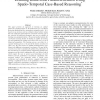Free Online Productivity Tools
i2Speak
i2Symbol
i2OCR
iTex2Img
iWeb2Print
iWeb2Shot
i2Type
iPdf2Split
iPdf2Merge
i2Bopomofo
i2Arabic
i2Style
i2Image
i2PDF
iLatex2Rtf
Sci2ools
114
click to vote
ICRA
2002
IEEE
2002
IEEE
Learning Behavioral Parameterization using Spatio-Temporal Case-Based Reasoning
This paper presents an approach to learning an optimal behavioral parameterization in the framework of a Case-Based Reasoning methodology for autonomous navigation tasks. It is based on our previous work on a behavior-based robotic system that also employed spatio-temporal case-based reasoning [3] in the selection of behavioral parameters but was not capable of learning new parameterizations. The present method extends the case-based reasoning module by making it capable of learning new and optimizing the existing cases where each case is a set of behavioral parameters. The learning process can either be a separate training process or be part of the mission execution. In either case, the robot learns an optimal parameterization of its behavior for different environments it encounters. The goal of this research is not only to automatically optimize the performance of the robot but also to avoid the manual configuration of behavioral parameters and the initial configuration of a case li...
Behavioral Parameters | Case-based Reasoning | ICRA 2002 | Optimal Behavioral Parameterization | Robotics |
| Added | 15 Jul 2010 |
| Updated | 15 Jul 2010 |
| Type | Conference |
| Year | 2002 |
| Where | ICRA |
| Authors | Maxim Likhachev, Michael Kaess, Ronald C. Arkin |
Comments (0)

